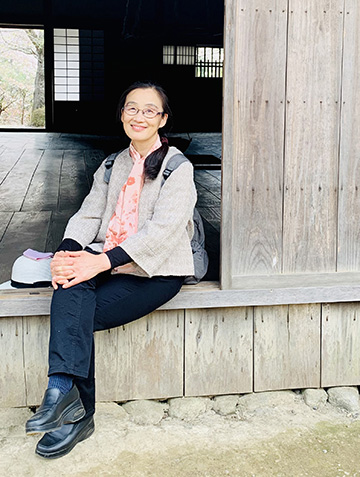
Xin Lin
In this installment of Senior Member Insights, OPN talks with Xin Lin—a senior researcher at Nakagawa Laboratories, Inc., Japan. Lin received her Ph.D. degree in optoelectronics from Shizuoka University, Japan, in 1996. During 1997-2009, she was a researcher at the National Institute of Advanced Industrial Science and Technology (AIST), Japan. Her research interests include optical wireless communications, optical information processing, optical neural networks and lidar.
What first interested you in pursuing science?
My excellent mathematics scores gave me a sense of closeness with natural sciences. I believe that a deep understanding of mathematics can help me pursue science more easily because every concept and principle of natural science runs through mathematics.
What aspect of your current work do you find the most interesting or exciting?
I am a scientist in optics, engaged in optical information processing, optical neural networks, lidar and optical wireless communication. These are hard and difficult but challenging and attractive studies. One of the most interesting aspects is the research and development of visible-light communication (VLC), because VLC can be considered a way to fuse science and art and change our daily lives by optics.
What tips for successful networking do you have for early-career professionals?
Respect, understand and remember everyone who works with you. Also, it is important to not only “get” but also “give” in your dealings with people.
How do you stay active and engaged with your field?
Have a deep understanding and provide unique and novel insights into my professional field, keeping at least one high-quality academic paper or other professional publication each year, conducting popular-science education for children or young people, and making concrete devices out of ideas and experimental results from the laboratory wherever possible.
What’s the best career decision you’ve ever made, and why?
When I could choose to be a translator or a researcher, I chose to be a researcher. This decision always makes me proud of my profession.
Describe a major turning point in your career. Was there a specific action/accomplishment that got you there?
The encounter with optical wireless communication (OWC)/visible-light Communication (VLC) was an important turning point in my research career. Before OWC/VLC, I worked on optical neural networks, which are biased towards basic research. OWC/VLC is applied research, and it is more convenient to convert the research results into a concrete object, which is exciting and easy to pour more love and enthusiasm into.
What is one piece of advice that you wish you were given as a student/early in your career?
Scientific research is a hard but fascinating profession. Love, concentration, enthusiasm, perseverance and being down-to-earth are essential qualities for a scientific researcher.
How important are leadership roles in career development, and how do you hone your leadership skills?
To complete a study requires the efforts and coordination of a whole team. Leadership skills are essential to managing a research team. Learn to trust and consider the big picture.
At this point in your career, what are you most looking forward to next?
I look forward to having enough funds and the ability to make some changes in the world using the power of light. Specifically, I expect that all lighting equipment will be able to transmit data while lighting, so that every lighting environment becomes an information communication environment. Where there is light, there is information.
If you weren’t in the sciences, what would be your dream career?
I want to become a writer. Maybe I will try to realize this dream after I retire.
